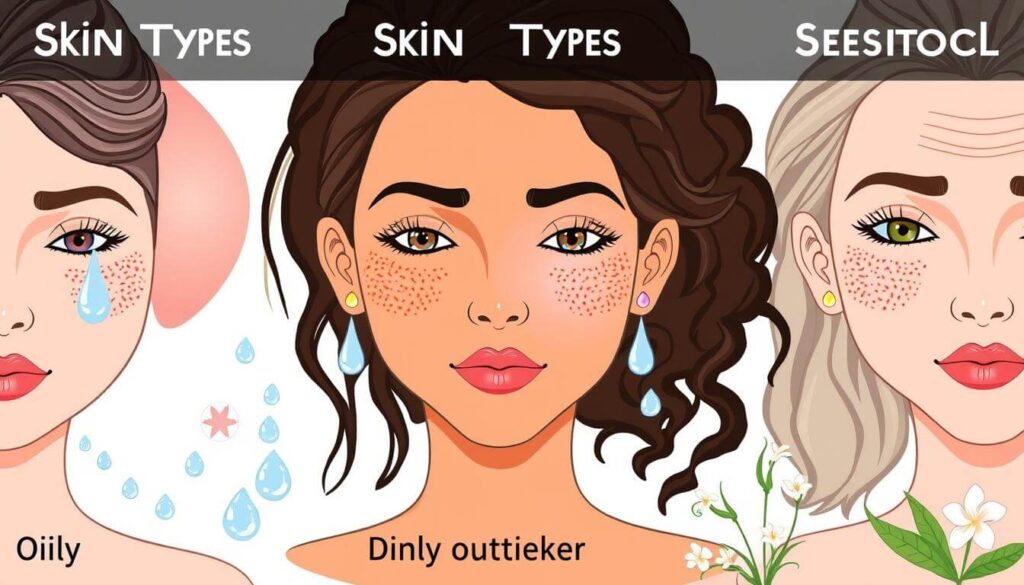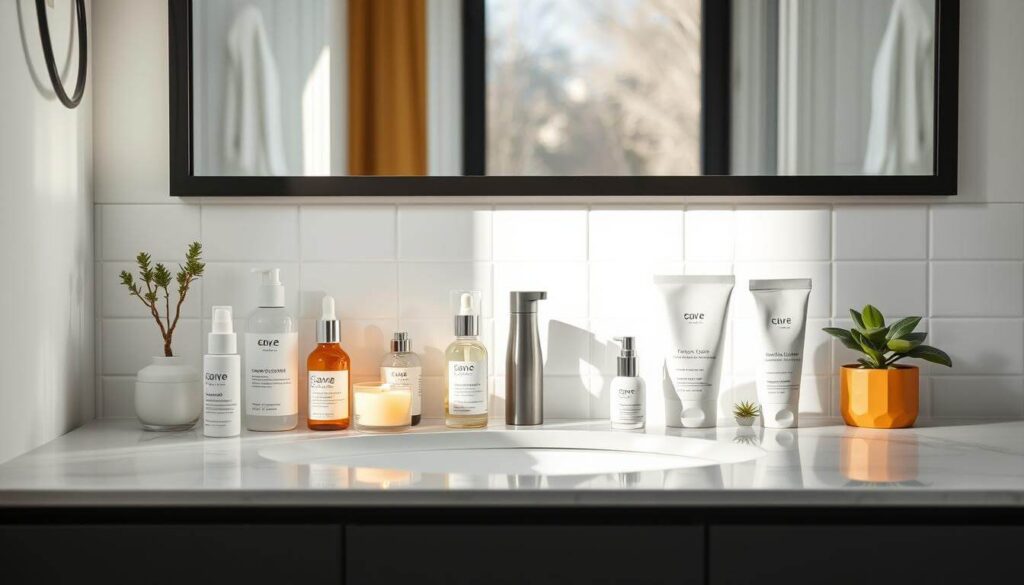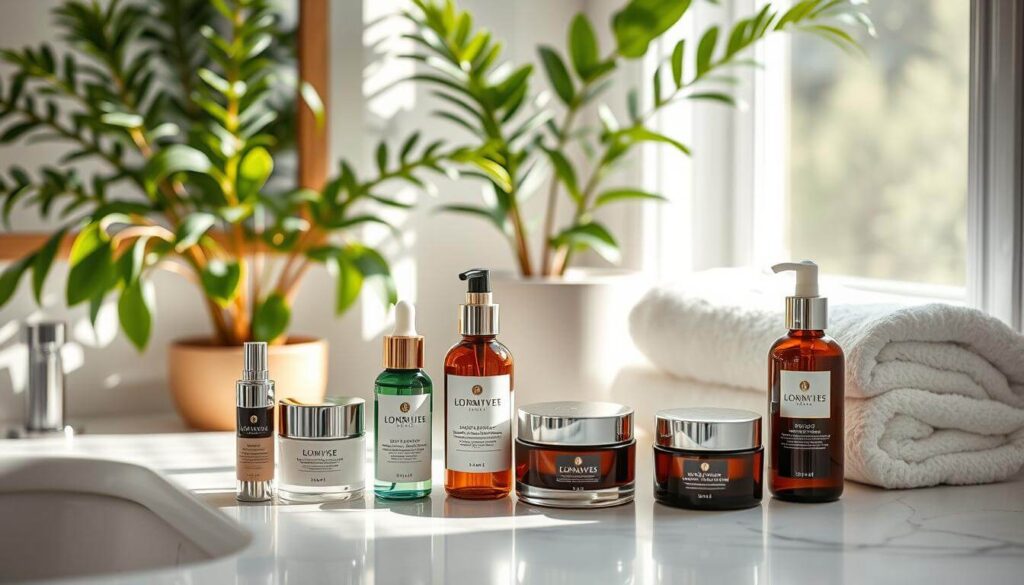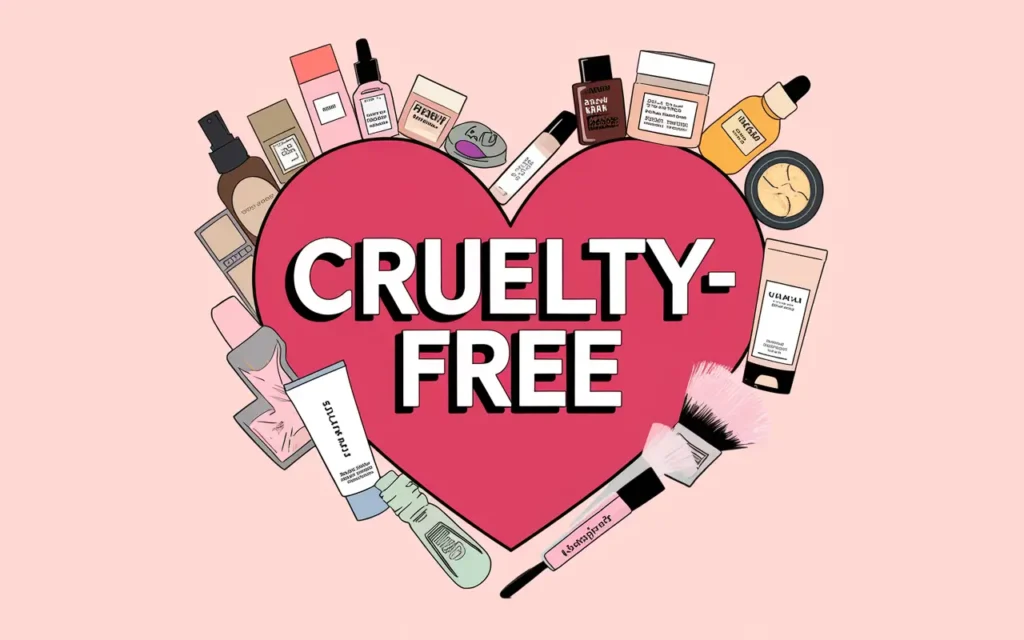How to Build a Simple and Effective Skincare Routine
Getting a healthy, glowing skin doesn’t have to be hard. This guide will help you create a simple yet effective skincare routine. It’s tailored to fit your unique skin type. Whether your skin is dry, oily, combination, or sensitive, we’ve got you covered.
You’ll learn the key steps, must-have products, and techniques to improve your skin. By following our step-by-step guide, you’ll get a radiant and youthful look.
- Understand your skin type and its specific needs
- Discover the importance of cleansing and choosing the right face cleanser
- Explore the benefits of moisturizing for healthy, hydrated skin
- Learn about the power of serums and their targeted effects
- Incorporate exfoliation for a glowing, rejuvenated complexion
- Prioritize sun protection as the ultimate anti-aging step
- Address blemishes and acne with over-the-counter and natural remedies
Understanding Your Skin Type
Knowing your skin type is key to a good skincare routine. Whether your skin is dry, oily, combination, or sensitive, knowing its type helps you choose the right products. This ensures you get the best results for your skin.
Dry Skin
People with dry skin often have tight, flaky, or rough skin. They might see fine lines or wrinkles. Dry skin can come from many things, like the weather, genetics, or health issues. To fight dryness, look for products with hyaluronic acid, ceramides, and plant oils.
Oily Skin
Oily skin looks shiny and greasy. It can get clogged pores and breakouts. This happens when your body makes too much oil, due to hormones, genes, or lifestyle. Use oil-free, non-comedogenic products to control oil and make your skin look matte.
Combination Skin
Combination skin has both dry and oily areas. The T-zone (forehead, nose, and chin) is usually oily, while the cheeks are dry. Managing this skin type means using products for both areas to balance your skin.
Sensitive Skin
Sensitive skin gets red, irritated, or reacts to certain things. People with sensitive skin should be careful with new products. Choose gentle, fragrance-free ones that don’t harm your skin’s barrier. Start with small amounts and test on a small area to avoid irritation.
Understanding your skin type helps you pick the right products and routines. Remember, your skin can change, so keep checking your needs and adjust your skincare plan as needed.

The Importance of Cleansing
Proper cleansing is key to a good skincare routine. It removes dirt, oil, and dead skin cells. This makes your skin ready to soak up the good stuff from other products. It also keeps your skin balanced, avoiding clogged pores and dullness.
Choosing the Right Face Cleanser
Finding the right face cleanser can be tough. But, there are important things to think about:
- Skin Type: Choose a gentle cleanser for dry or sensitive skin. If you have oily or acne-prone skin, a foaming cleanser might be better.
- Skin Concerns: Pick a cleanser with ingredients that target your specific issues. For example, salicylic acid for acne or ceramides for dryness.
- Texture Preference: Select a cleanser that feels good on your skin. Whether you like creamy, gel, or oil-based formulas.
Using a quality face cleanser daily is crucial for healthy, glowing skin. The right cleanser for your skin type is the first step to a better skincare routine.

Moisturizing for Healthy Skin
Keeping your skin healthy and hydrated is key for a bright, youthful look. Using the right moisturizers is vital. They help keep your skin’s natural barrier strong and moist. Whether your skin is dry, oily, or a mix, the right moisturizer can make a big difference.
Moisturizers help keep your skin from getting dry and flaky. They also prevent early signs of aging. By trapping water, they create a protective layer. This keeps your skin hydrated. Choosing top-notch moisturizers is important for keeping your skin hydration and health at its best.
Choosing the Right Moisturizer for Your Skin Type
Not every moisturizer is right for everyone. It’s important to pick one that fits your skin type and needs. Here are some tips to help you find the perfect moisturizer:
- For dry skin, choose creamy, rich moisturizers that deeply nourish and hydrate.
- Oily skin types do well with lightweight, oil-free moisturizers that won’t block pores.
- Combination skin needs a moisturizer that hydrates dry spots and controls oil in oily areas.
- Sensitive skin is best with gentle, fragrance-free moisturizers that calm and soothe.
Adding a daily moisturizing routine to your skincare is crucial for healthy, glowing skin. By picking the right moisturizers for your skin type, you ensure the best skin hydration and health.
“Proper moisturization is the foundation of a healthy, glowing complexion.”
The Power of Serums
Boost your skincare routine with serums. These powerful formulas target specific skin issues. They deliver active ingredients deep into your skin. Serums can help fight aging signs or brighten your skin.
Anti-Aging Serums
As we age, our skin loses collagen and elastin. This leads to wrinkles and a less firm look. Anti-aging serums fight these signs with antioxidants, peptides, and retinol. They boost collagen, smooth wrinkles, and make skin look young again.
Brightening Serums
Uneven skin tone is common, caused by sun, hormones, and stress. Brightening serums aim to reduce dark spots and discoloration. They use vitamin C, niacinamide, and kojic acid to brighten and even out your skin.
Adding a strong serum to your routine can change your skin. It’s a way to fight aging or get a brighter, younger look. These formulas are packed with power.
“Serums are the superheroes of skincare, delivering targeted solutions for a wide range of skin concerns.”
Exfoliation: The Key to Glowing Skin
Getting a radiant glow starts with exfoliation. This step removes dead skin cells, letting fresh skin show. Using exfoliants in your routine means saying hello to bright, youthful skin.
Exfoliation does more than just make your skin look good. It clears pores, makes skin smoother, and boosts other skincare products. The right exfoliation can make your skin glow.
Types of Exfoliants
Exfoliants come in two types: physical and chemical. Physical ones, like scrubs, remove dead skin mechanically. Chemical ones, like alpha-hydroxy acids and beta-hydroxy acids, break down dead cells.
- Physical exfoliants: Use a soft washcloth, loofah, or brush to gently remove dead skin.
- Chemical exfoliants: Look for glycolic acid, lactic acid, or salicylic acid for a brighter look.
Begin with 1-2 exfoliation sessions a week. Increase as your skin gets used to it. Too much can irritate your skin, so listen to it.
| Exfoliant Type | Benefits | Best Suited For |
|---|---|---|
| Physical Exfoliants | Mechanically removes dead skin cells, improves skin’s smoothness | Normal to oily skin types |
| Chemical Exfoliants | Dissolves dead skin cells, reveals brighter complexion, unclogs pores | Dry, sensitive, or acne-prone skin types |
Exfoliation unlocks your skin’s natural glow. Adding it to your routine will lead to a radiant, youthful look.
Sun Protection: The Ultimate Anti-Aging Step
Protecting your skin from harmful UV rays is key to anti-aging. The sun’s UV rays can cause wrinkles, age spots, and lose skin elasticity. Using a daily sunscreen keeps your skin young and radiant.
Choosing the Right Sunscreen
Finding the right sunscreen can be tough. Here are some tips:
- Sun Protection Factor (SPF): Pick a sunscreen with SPF 30 or higher. It blocks up to 97% of UVB rays.
- Broad Spectrum Protection: Make sure it protects against UVA and UVB rays for full protection.
- Skin Type: For oily or acne-prone skin, choose a lightweight sunscreen. Dry skin needs a moisturizing one.
- Reef-Safe Ingredients: Stay away from oxybenzone and octinoxate to protect marine life.
Using a good sunscreen every day is vital for healthy, anti-aging skin. It shields your skin from sun damage, keeping you looking young and radiant.
“The sun may be the source of all life, but it is also the source of many skin problems. Protecting your skin from its harmful rays is one of the best ways to maintain a youthful appearance.” – Dermatologist, Dr. Sarah Johnson
Blemish Control and Acne Treatment
Dealing with blemishes and acne can be tough. But, there are many ways to get clear, healthy-looking skin. This section will show you how to get rid of blemishes and acne for good.
Over-the-Counter Acne Treatments
Looking for quick acne relief? There are many over-the-counter treatments. They have ingredients like benzoyl peroxide and salicylic acid. These help unclog pores and prevent more breakouts.
When picking a treatment, choose one that fits your skin type and needs.
Natural Remedies for Blemishes
Natural remedies can also help with blemishes. Some effective ones include:
- Tea tree oil: It fights acne-causing bacteria and reduces redness.
- Honey: It soothes and heals blemishes.
- Aloe vera: It cools and hydrates irritated skin.
- Witch hazel: It removes excess oil and unclogs pores.
Always do a patch test with natural remedies first. Mixing over-the-counter and natural treatments can help keep your skin clear and healthy.
How to Build a Simple and Effective Skincare Routine
Creating a simple yet effective skincare routine is key to healthy, glowing skin. By following the essential steps we’ve discussed, you can make a routine that fits your skin type and needs. Let’s explore how to build a skincare regimen that enhances your complexion.
Cleansing is the first step in any great skincare routine. Choose a gentle face wash that removes dirt, oil, and impurities without drying your skin. Then, apply a hydrating moisturizer to keep your skin moist and nourished.
Adding a targeted serum can elevate your routine. Serums are strong treatments that tackle specific issues, like anti-aging or brightening. Use them before your moisturizer for the best results.
Regular exfoliation is vital for a radiant, smooth complexion. Exfoliating gently removes dead skin cells, improving texture and helping your other products work better.
Lastly, remember the importance of sun protection. Using a broad-spectrum sunscreen daily is a key anti-aging step. It protects your skin from harmful UV rays.
By following these steps and customizing your routine for your skin type, you can create a simple yet effective skincare routine. This will make your skin look and feel its best.
Incorporating Natural Ingredients
Skincare benefits from natural ingredients are huge. Using plant-based items in your routine can greatly improve your skin’s health and look. Natural skincare, which helps with inflammation and hydration, is becoming very popular.
Benefits of Natural Skincare
Choosing natural skincare can change how your skin looks and feels. Here are some benefits you might see:
- Gentle, non-irritating formulas that are kind to sensitive skin
- Rich in antioxidants to protect against environmental stressors
- Deeply nourishing ingredients that hydrate and replenish the skin
- Natural plant-based compounds that can help reduce the appearance of fine lines and wrinkles
- Minimal risk of harsh chemical irritation or disruption of the skin’s natural pH balance
Adding natural ingredients to your skincare routine opens up a world of benefits. It not only makes your skin healthier and more vibrant but also supports a sustainable lifestyle.
| Natural Ingredient | Skincare Benefits |
|---|---|
| Aloe Vera | Soothing, hydrating, and anti-inflammatory properties |
| Vitamin C | Brightening, collagen-boosting, and antioxidant protection |
| Rosehip Seed Oil | Rich in essential fatty acids to nourish and repair skin |
| Green Tea | Packed with antioxidants to combat free radical damage |
By focusing on natural ingredients, you can greatly improve your skin’s health and look. This choice also supports a sustainable and eco-friendly lifestyle. Let nature’s power transform your skin’s appearance.
Skincare for Different Ages
As we age, our skin’s needs change. It’s important to have a skincare routine that fits your age. This helps keep your skin healthy and glowing. Let’s look at how to care for your skin in your 20s, 30s, 40s, and beyond.
Skincare in Your 20s
In your 20s, your skin is strong. Start with a simple routine that feeds and protects it. Use gentle cleansers, moisturizers, and sunscreen to fight aging and pollution. Add light, water-based serums to tackle acne, dullness, and texture issues.
Skincare in Your 30s
In your 30s, your skin starts to show signs of aging. Use anti-aging products with retinoids, peptides, and antioxidants. These help make collagen and reduce wrinkles. Exfoliate often to brighten your skin, and keep it moist with rich moisturizers.
Skincare in Your 40s and Beyond
In your 40s and later, your skin needs special care. Use firming serums, brightening creams, and hydrating masks to tackle aging signs. Stick to gentle cleansers, moisturizers that repair, and sun protection to keep your skin looking young.
No matter your age, the secret to great skin is sticking to your routine and choosing the right products. By adjusting your skincare as you age, you can keep your skin looking young and radiant.
Consistency is Key
Keeping a regular skincare routine is essential for healthy, glowing skin. It’s not just a trend, but a proven way to reach your skin goals. Whether you want to fight acne, reduce wrinkles, or keep your skin bright, sticking to your skincare plan is crucial.
Creating a consistent skincare routine consistency might seem hard at first. But the benefits are worth it. By making skincare part of your daily life, you’ll see real changes that will keep you going.
- Start small: Add one or two new products at a time. Let your skin get used to them and make the routine a habit.
- Set reminders: Use your phone or calendar to remember when to do your skincare. This way, you’ll never forget.
- Stick to a schedule: Use the same time every day for your skincare. It becomes a natural part of your routine.
- Be patient: Getting the best skin takes time and regular effort. Keep up with your routine, even when you feel like skipping it.
Being consistent with your skincare consistency unlocks your products’ full power. Making it a habit will greatly improve your skin’s health and look.
“Consistency is the foundation of any successful skincare routine. It’s not about perfection, but about showing up for your skin, day in and day out.”
Remember, your skin changes often, so adjust your routine as needed. Stay consistent and enjoy the journey to a brighter, healthier complexion.
Conclusion
In this guide, you’ve learned how to make a simple skincare routine. It’s tailored to your skin type and needs. Now, you can keep your skin healthy and glowing.
Having a regular skincare routine helps with many skin issues. This includes dryness, oiliness, aging signs, and blemishes. You know how to clean, moisturize, and use special treatments like serums and exfoliants, no matter your skin type.
Creating a good skincare routine is a journey. It might take some time to find the right products for you. Be patient, stay consistent, and be ready to change your routine as your skin changes. With the right steps, you can get a healthier, younger-looking skin.
FAQ
What are the essential steps in a skincare routine?
A good skincare routine includes cleansing, moisturizing, and protecting from the sun. Adding serums and exfoliants can help with specific skin issues.
How do I determine my skin type?
Look at your skin’s characteristics to find out your type. It could be dry, oily, combination, or sensitive. A dermatologist or online tools can also help.
What is the importance of using a face cleanser?
Cleansing is key to a good skincare routine. It removes dirt, oil, and makeup. This prepares your skin for other products.
How do I choose the right moisturizer for my skin?
Choose a moisturizer based on your skin type and concerns. Look for one that meets your specific needs, like hydration or anti-aging.
What are the benefits of using serums?
Serums are strong products that target specific skin issues. They can help with lines, tone, or dullness. They give your skin a boost of active ingredients.
Why is exfoliation important for healthy skin?
Exfoliation removes dead skin cells and unclogs pores. It makes your skin look brighter and helps other products work better. It also prevents blemishes.
How do I choose the right sunscreen?
Choose a sunscreen with broad-spectrum protection and an SPF of 30 or higher. Pick one that fits your skin type. Mineral or hybrid sunscreens are good for sensitive skin.
What are some effective over-the-counter treatments for acne?
Over-the-counter acne treatments include products with salicylic acid, benzoyl peroxide, or retinoids. These help unclog pores and reduce inflammation. They can prevent future breakouts.
What are the benefits of using natural skincare ingredients?
Natural ingredients can nourish and soothe your skin. They’re great for sensitive skin or those who prefer natural skincare.
How does my skincare routine change as I age?
Your skincare needs change with age. In your 20s, focus on a healthy glow. In your 30s, add anti-aging products. In your 40s and beyond, focus on hydration and brightening.



